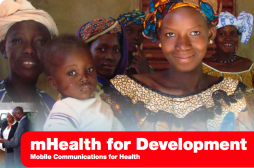Using mobile phones has enormous potential for increasing access to healthcare for poor people aroundd the world, and for improving clinical outcomes. Now a new association, the mHealth Alliance, has been launched to support this emerging field and increase the scale and impact of the many small prokects around the world.
So new, the Alliance has so far no website, press release, or organization yet, it was announced to the BBC as part of the GSMA World Congress in Barcelona. The mHealth Alliance is currently under the auspices of three foundations, the UN and Rockefeller Foundations in the United States, and the UK-based Vodafone Group Foundation.
Deploying mobiles in health care in developing countries is not only promising for health outcomes, it is also a hot and potentially lucrative business area. There is enormous interest by NGOs, donors, telcoms, mobile vendors, researchers, and governments in the the use of mobile phones for increasing healthcare for the poorest people in the world.
A recently-published report (UPDATED from earlier post), produced by Vital Wave Consulting for the UN Foundation, notes the most compelling areas for m-health: public education around good health practices, right now especially focused on HIV/AIDS; health record management; monitoring and medication compliance such as what has been successfully used with SMS reminders for TB; disease tracking; and telemedicine, for example. In many of these areas we have reported on interesting and innovative projects here on MobileActive.org.
But in many instances, the scope and scale of the many m-health projects underway has been limited by cost, technical limitations, and political will. In fact, some of the most promising efforts - pilots with limited scope, donated airtime, and demonstrable effect -- do not exist anymore.
The UN Foundation notes: "In order to move mHealth to a greater level of effectiveness, current efforts need to be brought to scale, their sustainability needs to be ensured and their health impacts must be measured."
Claire Thwaites, the director of the Technology Partnership between the UN Foundation and Vodafone Group Foundation is quoted as saying,
"The biggest problem is fragmentation of small projects...A lot of the work being done on the ground is NGO- and foundation-led, but let's join those efforts with the Microsofts and the Qualcomms and the Intels and the Vodafones. There's a business case for it now; you have to have the experience of the NGOs on the ground talking to the big corporates out there and creating real business models, and that's why I think the mHealth Alliance can tackle that."
The mHealth Alliance was conceived last summer by key stakeholders at a retreat at the Rockefeller Foundation's Bellagio Center. In a call to action, the participants called for the creation of a "a new mHealth Alliance to focus attention and increase multi-stakeholder dialogue on the critical issue of mobile health (mHealth) and the Millennium Development Goal,"
Discussions for the Alliance have been in the works for the last six months but so far there is little more detailed information about the membership, organizations, or specific goals.
We really think that an Alliance in this exploding field is urgently needed. We hope that as the discussions continue, the Alliance is open and inclusive, clear in its goals, and focused on reducing barriers to as well as creating an enabling environment for m-health initiatives in developing countries.
Photo Courtesy UN Foundation Technology Partnership


Post new comment